Find out how to use different keyword research steps and techniques to inform your marketing themes and messages. Using keywords for research means giving your customers what they want
As one of the fundamental, foundational elements of effective search engine optimization (SEO), using keywords for research enables digital marketers to understand what consumers are looking for online and the potential opportunities to capture this interest and attention through the creation of relevant content and optimized user experiences.
Using keywords for research: campaign or always on?
SEO is often seen as an always-on, hygiene activity that is necessary before, during, and after campaigns but rarely seen as an integral part of a campaign itself. However although keyword research can be very useful for unearthing larger, more permanent content opportunities for an owned media presence, the process itself can also be used to help inform ideas, themes, and concepts for a campaign, whilst adding a level of objectivity and rigor to campaign discussions.
Marketing strategy
Smart Insights is all about supporting marketers to use data to inform their marketing strategies and campaign planning. That's why we recommend utilizing the RACE Framework to structure your marketing activities across plan, reach, act, convert, and engage.
Book your free 1-2-1 consultation call today to discuss your marketing funnel. In your dedicated meeting, a member of our team can help you identify opportunities and challenges for your strategy, through the RACE Framework Need a winning marketing strategy?
Book your free 1-2-1 consultation to develop your new strategy with the RACE Framework
Book consultation
Define the communication task
Every campaign planning process should start with a clear view of the communication task and a summary of the marketing challenge to ensure that everyone is aligned and working to the same brief.
The GET - WHO - TO - BY framework is a very effective way of articulating the overall campaign objective. For the purpose of this post let’s imagine we’re a medium/ large B2B technology provider venturing into the emerging artificial intelligence (AI) space and planning a promotional campaign (using paid, owned and earned media) to raise awareness of our AI proposition:
GET - senior IT and analytics executives in the UK
WHO - are currently unaware of our company’s increasingly innovative artificial intelligence (AI) offering
TO - 1) become interested and aware of our AI proposition, 2) contact us to find out more information and start a conversation
BY - providing clear use cases and highlight our company’s authority, innovation and expertise on the topic of AI
This summary gives us the background information we need to begin investigating what people are actually searching for online and the potential content and topics we can use to underpin a broader promotional campaign.
Build your initial keyword list
With a clear understanding of the marketing challenge, we can move on to the first steps of using keywords for research. This stage involves a broad exploration of different keywords based on one or two ‘seed’ phrases. SEO tools such as Searchmetrics, Moz or SEMRush can be very helpful to deep dive into the detail.
We can see from the SEMRush example below that the selection of one ‘seed’ phrase (in this case ‘artificial intelligence’) reveals a number of semantically relevant possibilities grouped by theme, e.g. learning, healthcare, application, etc.).
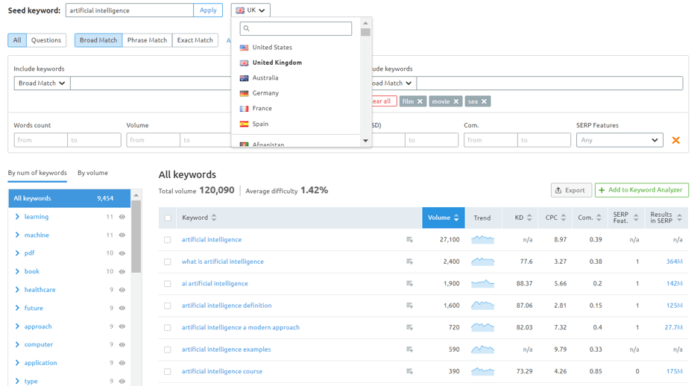
From this point onwards, the main task is to review keywords that are closely related to your initial search and start producing groups that contain the main search query supplemented by keyword modifiers, i.e. keywords that produce variations without changing the meaning of the query. In our example, this will include terms such as ‘what is artificial intelligence’, ‘future of artificial intelligence’ and ‘artificial intelligence solutions’.
Our B2B business company is likely to already have AI-related content on their site so it may also be worth looking at what is currently ranking and compare this versus a selection of key competitors:
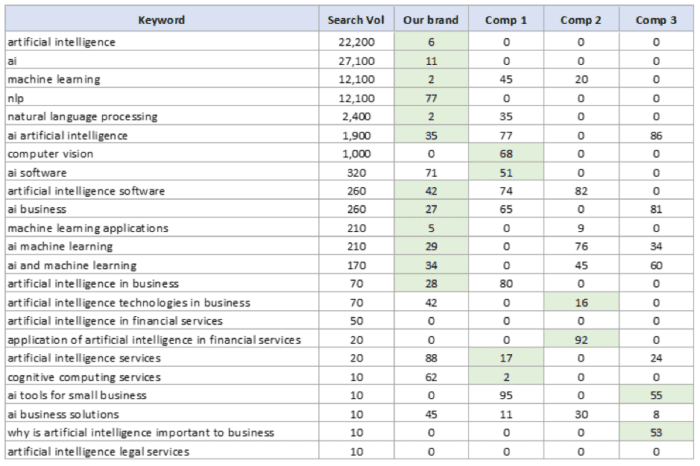
We can immediately see that our company is performing very well for certain high volume, informational terms such as ‘artificial intelligence’ and ‘machine learning’ but not so well for transactional terms, including ‘artificial intelligence services’ and ‘ai business solutions’. Based on the communication task for this particular campaign, these transactional terms will be very important. Whilst they may have comparatively lower volumes it suggests very strong user intent for specific solutions that our company can meet.
Refine your keyword list
Now that we have a clear view of the overall keyword landscape for our main keywords, the next stage involves taking all these possible keywords and sorting them into more meaningful categories. This will enable us to start using keywords for research into defining potential themes for our promotional campaign:
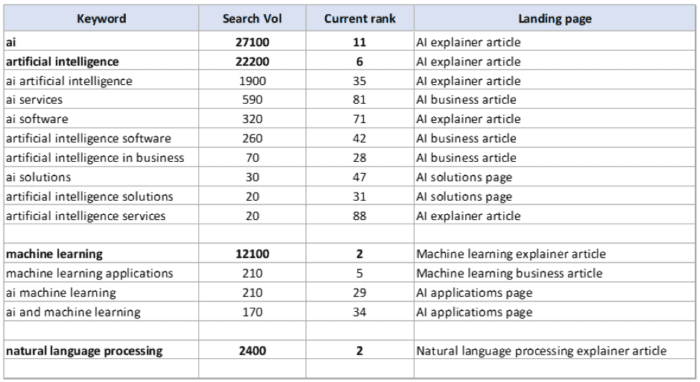
During this stage, it’s also useful to reference the landing pages associated with each of the relevant keywords in addition to search volume and current rank. This will give you a view of what content already exists and how this could potentially be leveraged as part of the campaign.
In our example the keyword grouping exercise indicates that there are three broad themes with related sub-themes:
- Artificial intelligence and AI
- AI services
- AI software
- AI solutions
- Machine learning
- Machine learning applications
- AI and machine learning
- Natural language processing
Although other terms such as ‘computer vision’ and ‘cognitive computing’ showed up in our broad keyword research earlier on, these terms either do not have sufficient keyword volume and/ or are less relevant to the business than those we chose to take forward.
Align keyword themes with your marketing funnel
Let’s remind ourselves again of the campaign strategy:
Provide clear use cases and highlight our company’s authority, innovation, and expertise on the topic of AI.
Although the details for the campaign will be ironed out later down the line, even at this early stage it’s reasonable to suggest that content will play two important roles:
- Build and cement the company’s reputation in the field of AI
- Demonstrate the practical uses of AI and the services the company can offer in this area
The keyword research indicated that the company is performing very well for some high volume, informational terms (e.g. ‘artificial intelligence’ and ‘machine learning’). The existing web pages and content related to these terms sit at the top of the funnel (TOF) and can be useful for generating reach to a broad audience.
However whilst this content is good at highlighting the company’s authority in AI, not everyone searching for a term like ‘artificial intelligence’ will be in the market for AI solutions more specifically.
Build your funnel by using keywords for research
The keyword research also showed that there is a content gap for lower volume, more transactional terms (e.g. ‘ai software’ and ‘ai services’), all of which will be important for demonstrating the company’s practical expertise and services in the AI space. This content will sit in the middle (MOF) and the bottom of the funnel (BOF). With all this data to hand it’s worth considering what type of content could be used and how this aligns to the sales funnel:
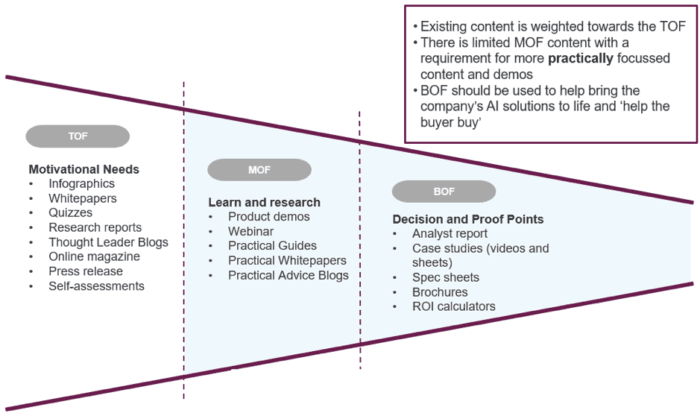
The diagram above illustrates how different content types related to the keywords we have identified can be used throughout the different stages of the sales funnel. This process helps us to identify any potential content gaps but also recommends different types of content that can be used as part of the wider promotional campaign.
Using the RACE Framework to optimize your marketing funnel
Our RACE Framework is a popular marketing structure framework for marketers and managers to plan, manage, and optimize their always-on and campaign marketing activities.
Simply put, RACE guides marketers through a 5-step process of plan, reach, act, convert, and engage, based around your customers' experiences of your company.
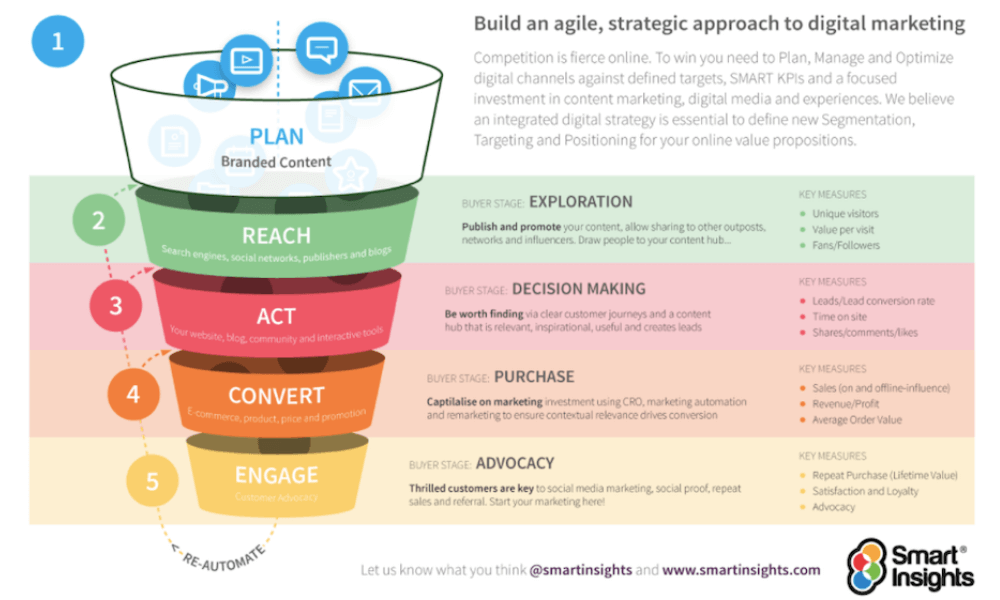
Book your free 1-2-1 consultation call today to discuss the challenges and opportunities in your marketing strategy using the RACE Framework. Get started today. Need a winning marketing strategy?
Book your free 1-2-1 consultation to develop your new strategy with the RACE Framework
Book consultation
Using keywords for research across your omnichannel touchpoints
Even if your campaign is heavily focused in favour of outdoor (awareness) and direct mail and email (conversion and engagement), the keyword themes we’ve defined can influence both the messaging and ensure a range of digital content is used to support the campaign at every stage of the funnel.
This could include broader AI or machine learning themed infographics and blog posts to raise awareness, as well as more specific webinars and product demos to show how AI services and software really works in practice across a range of industries, backed up by analyst reports and case studies to prove the company’s credibility in this space.
Each piece of content will mirror the keyword themes outlined upfront, which could include ‘AI services’, ‘Artificial intelligence software’, ‘AI solutions’ and ‘Machine learning applications’.

Using keywords for researh
Using keywords for research is a tried and trusted practice that search marketing professionals use on an almost daily basis to optimize content based on what people are really searching for online.
However, the insight that keyword research generates is often siloed and remains hidden or ignored from broader above-the-line campaign planning.
But with a clear articulation of a campaign communication task (the Get-To-By) keyword research can be used to help influence and define any campaign’s key messages and themes, ensuring that the right words, phrases, and language is used for a range of different content types to resonate with a target audience.













